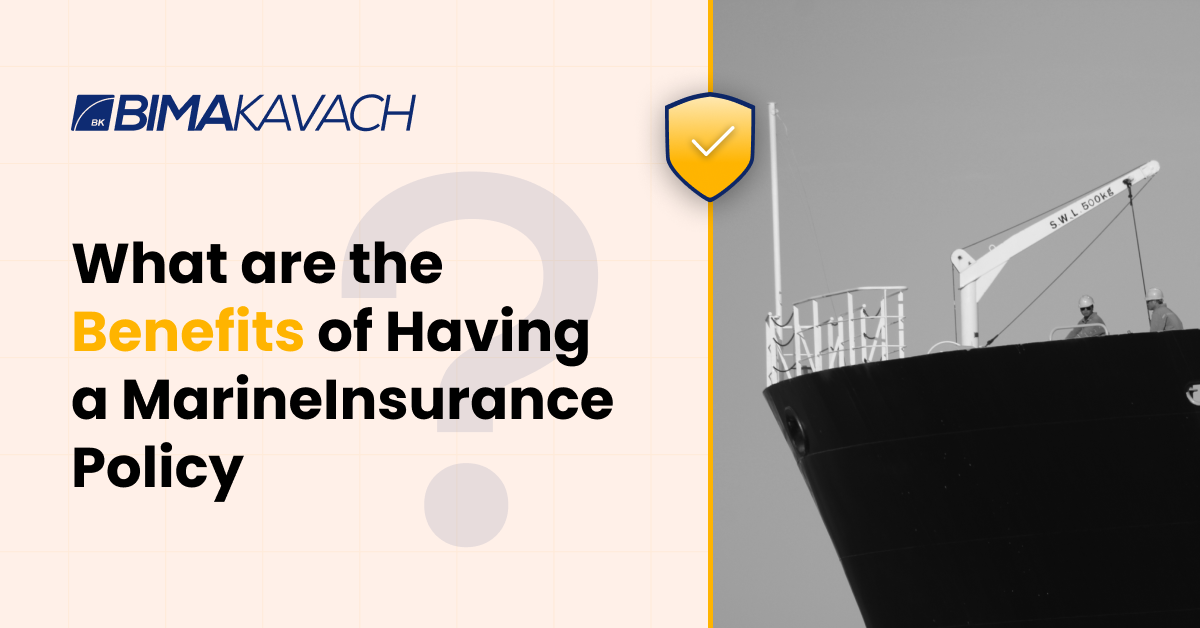Marine insurance is a type of insurance policy that provides coverage for marine vessels, cargo, and related liabilities. It is designed to protect the owner of the vessel or cargo from financial loss due to damage or loss of the insured property. As shipowners and businesses set sail into the 'deep waters' of marine insurance, a fundamental understanding of the prerequisites for acquiring such coverage is essential. This article aims to explore the key requirements for availing a marine insurance policy.
Eligibility Criteria for Marine Insurance
Not everyone can simply purchase a marine insurance policy. Certain requirements must be met before you can qualify to avail of the coverage. These requirements may vary depending on the type of policy and the insurance provider Here are some of the eligibility criteria for acquiring marine insurance:
1. Insurable Interest
To procure a marine insurance policy, the first and foremost requirement is having an insurable interest. This means that the party seeking insurance must demonstrate a financial stake in the property or cargo being insured. Shipowners, cargo owners, and other entities directly involved in the maritime venture typically fulfil this criterion.
2. Ownership of the Vessel
The owner of the vessel or carrier must have a valid registration or documentation. This means that the boat must be officially registered with the relevant authorities and that the owner has the necessary documents to prove ownership. This means the owner of the vessel must have legal ownership of the vessel or be authorized to insure it. If the vessel is owned by a company, the company must be registered and authorized to own the vessel.
Get Free Quote in Minutes
3. Type of Vessel
Marine insurance policies are available for different types of vessels, including cargo ships, pleasure boats, fishing boats, and yachts. The type of vessel will determine the type of coverage required and the premium payable. The insurer will also consider the age, condition, and value of the vessel when assessing the risk.
4. Purpose of the Vessel
The purpose of the vessel is also an important consideration when applying for marine insurance. The insurer will want to know whether the vessel is used for commercial or personal purposes. Commercial vessels will require more comprehensive coverage due to the higher risk involved.
5. Experience and Qualifications of the Owner
The experience and qualifications of the vessel owner will also be taken into account when assessing eligibility for marine insurance. The owner must have the necessary skills and knowledge to operate the vessel safely. The insurer may require proof of qualifications and experience before issuing a policy. Also, the owner of the vessel must have a clean record. This means that they should not have any previous claims or accidents that would make them a high-risk client. Insurance companies will often check an individual's claims history before offering them coverage. In some cases, they may also require a survey or inspection of the vessel to assess its condition and value.
6. Compliance with Safety Regulations
The vessel must comply with all safety regulations and standards set by the relevant authorities. This includes having the required safety equipment on board, such as life jackets, fire extinguishers, and distress signals. Failure to comply with safety regulations may result in the insurer refusing to issue a policy.
Types of Marine Insurance Policies
Marine insurance policies can be broadly classified into three types: Hull Insurance, Cargo Insurance, and Freight Insurance.
Hull Insurance
Hull insurance covers the physical damage to the vessel, including the ship's machinery and equipment. It provides protection against risks such as collisions, grounding, and sinking. Hull insurance can be further categorized into:
- Time Policies: These policies provide coverage for a specified period, usually a year.
- Voyage Policies: These policies provide coverage for a particular voyage or a series of voyages.
Cargo Insurance
Cargo insurance covers the goods being transported by the vessel. It provides protection against risks such as theft, damage, and loss of cargo. These policies can be of two types-
· Inland Transit Insurance: Covers the transportation of goods within a country, whether by road, rail, or inland waterways.
· Export/Import Insurance: Provides coverage for goods during international transit, whether by sea, air, or land. It protects against risks like theft, damage, and loss.
Freight Insurance
Freight insurance covers the loss of income that a shipowner or a charterer may suffer due to the loss or damage of cargo. It provides protection against risks such as cargo damage, non-delivery, and delay in delivery. Freight insurance can be further categorized into:
- Gross Freight Policies: These policies provide coverage for the entire freight value.
- Net Freight Policies: These policies provide coverage for the net freight value after deducting any expenses incurred in earning the freight.
Key Factors to Consider When Buying a Marine Insurance Policy
When it comes to buying a marine insurance policy, several key factors should be taken into consideration. These include:
1. Type of Coverage Needed
The type of coverage needed will depend on the specific circumstances of the vessel and its intended use. Whether it's hull insurance for the vessel, cargo insurance for goods in transit, or liability insurance, selecting the right coverage is essential.
2. Insurance Provider
Choosing the right insurance provider is crucial when it comes to buying a marine insurance policy. It is important to choose a provider with a good reputation and a track record of providing quality coverage and excellent customer service.
3. Premiums and Deductibles
Premiums and deductibles will vary depending on the type of coverage needed and the specific circumstances of the vessel. It is important to carefully consider the cost of premiums and deductibles and ensure that they are affordable.
4. Policy Limits
Policy limits refer to the maximum amount that the insurance provider will pay out in the event of a claim. It is important to carefully consider policy limits and ensure that they are adequate to cover any potential losses.
5. Exclusions and Limitations
Exclusions and limitations refer to specific circumstances or events that are not covered under the policy. It is important to carefully review any exclusions and limitations and ensure that they are acceptable.
6. Claims Process
In the event of a claim, it is important to have a clear understanding of the claims process and what is required to file a claim. It is important to choose an insurance provider with a clear and efficient claims process to ensure that any claims are handled quickly and efficiently.
Overall, buying a marine insurance policy requires careful consideration of a range of factors. By taking the time to carefully review these factors and choose the right provider and policy, vessel owners can ensure that they are adequately protected in the event of any unforeseen circumstances.

Benefits of Having a Marine Insurance Policy
Marine insurance policies provide a wide range of benefits to their policyholders. These benefits include:
- Financial protection: Marine insurance policies offer financial protection to the policyholders against various risks associated with marine transportation. It covers the loss or damage caused to the ship, cargo, or any third-party property during transit.
- Compliance with Regulatory Requirements: Many industries, including shipping and logistics, require businesses to have marine insurance to comply with regulatory standards. Having a compliant insurance policy ensures that businesses meet legal requirements, avoiding potential penalties and operational disruptions.
- Peace of mind: Marine transportation involves many risks, and having a marine insurance policy provides peace of mind to the policyholder. It ensures that the policyholder is protected against any financial loss that may arise due to unforeseen circumstances.
- Customizable coverage: Marine insurance policies offer customizable coverage options to the policyholders. The policyholder can choose the coverage that best suits their needs and budget.
- Liability Coverage: Marine insurance policies often include liability coverage, protecting businesses and individuals against third-party claims for bodily injury, property damage, or environmental pollution caused by the insured maritime activities.
- Continuity of Business Operations: In the event of a covered loss or damage, marine insurance helps businesses maintain continuity by facilitating timely repairs or replacements. This is crucial for ensuring that shipping and trade operations can resume without significant interruptions.
Conclusion
We have unveiled the fundamental prerequisites to avail of comprehensive and protective maritime coverage. We have seen that, from establishing insurable interest to adhering to regulatory guidelines, the journey to acquiring a marine insurance policy demands careful consideration and due diligence. We can conclude by saying that, the requirements to buy a marine insurance policy serve as the compass, guiding shipowners, and businesses toward a horizon where challenges are met with preparedness.
Frequently Asked Questions
- What documents are needed to purchase a marine insurance policy?
To purchase a marine insurance policy, the following documents are typically required:
- Vessel registration documents
- Ownership documents
- Cargo details
- Voyage details
- Previous insurance policy details (if applicable)
2. How does marine insurance protect shipping businesses?
Marine insurance protects shipping businesses by providing financial protection against potential losses due to damage or loss of cargo, vessel, or third-party liabilities. It helps businesses to continue their operations without significant financial loss.
3. What are the essential conditions of a marine insurance policy?
The essential conditions of a marine insurance policy include:
- The policy must be in writing
- The insured must have an insurable interest in the subject matter
- The insured must disclose all material facts
- The policy must be based on a valid contract of marine adventure
- The policy must be subject to the laws of the country where it is issued
4. What is the process for making a claim on a marine insurance policy?
To make a claim on a marine insurance policy, the insured must notify the insurer as soon as possible after the loss or damage occurs. The insurer will then investigate the claim and determine the amount of compensation to be paid based on the terms of the policy. The insured must provide all necessary documents and information to support the claim.

